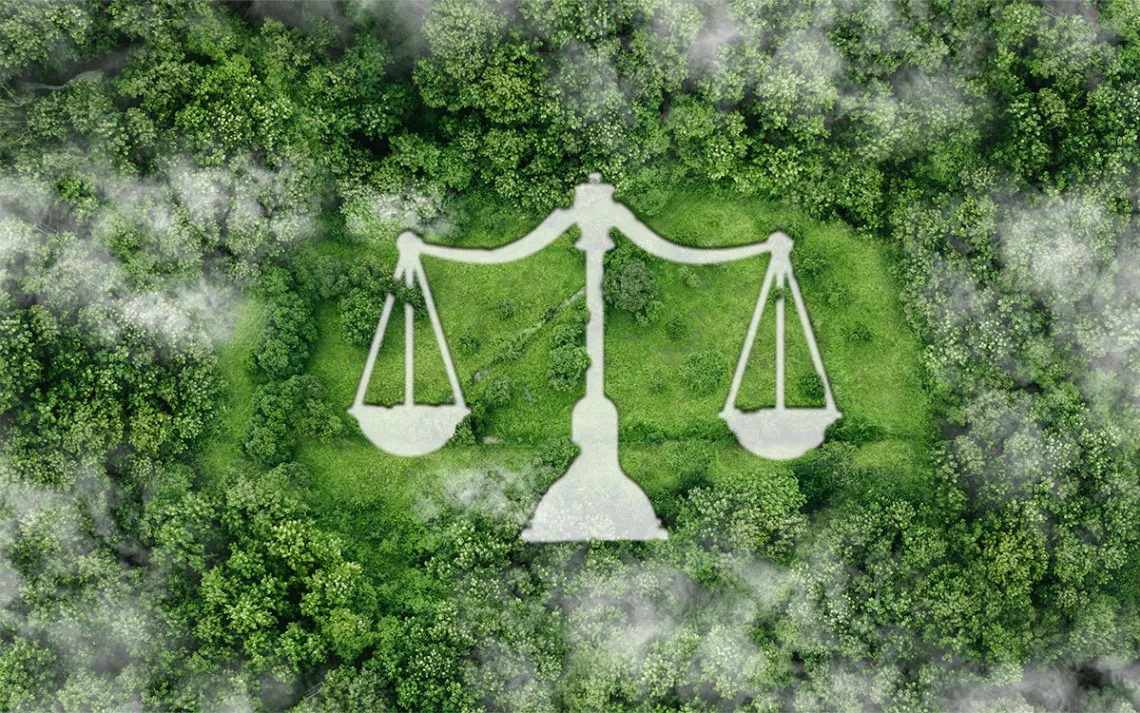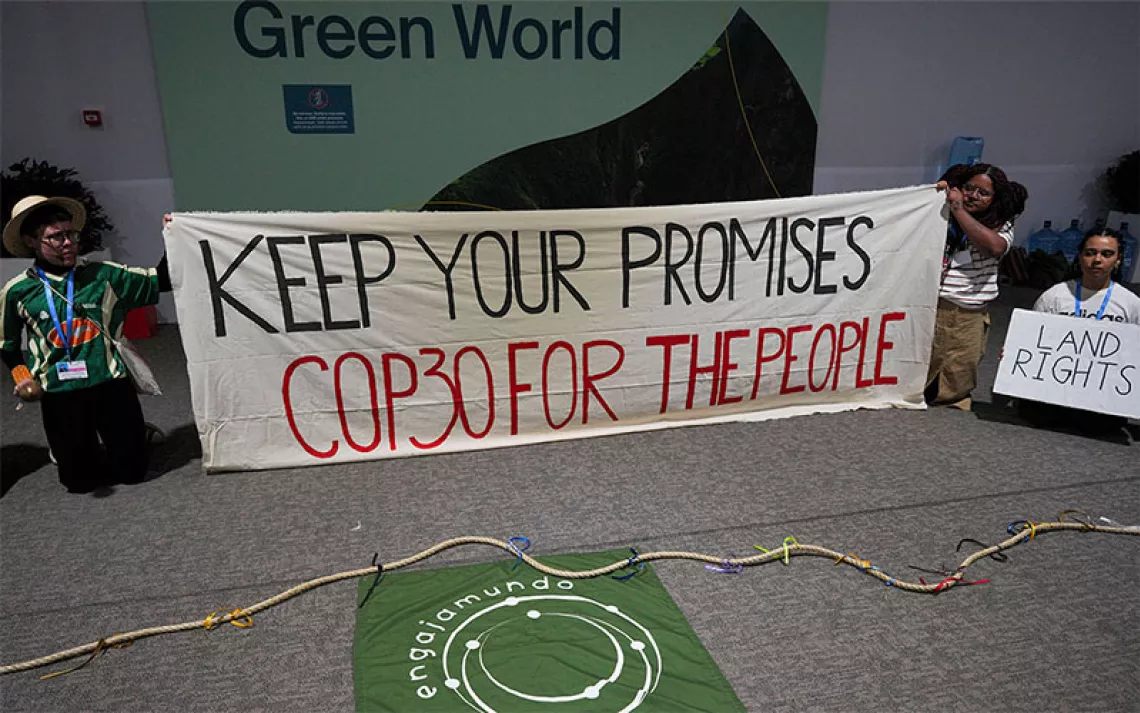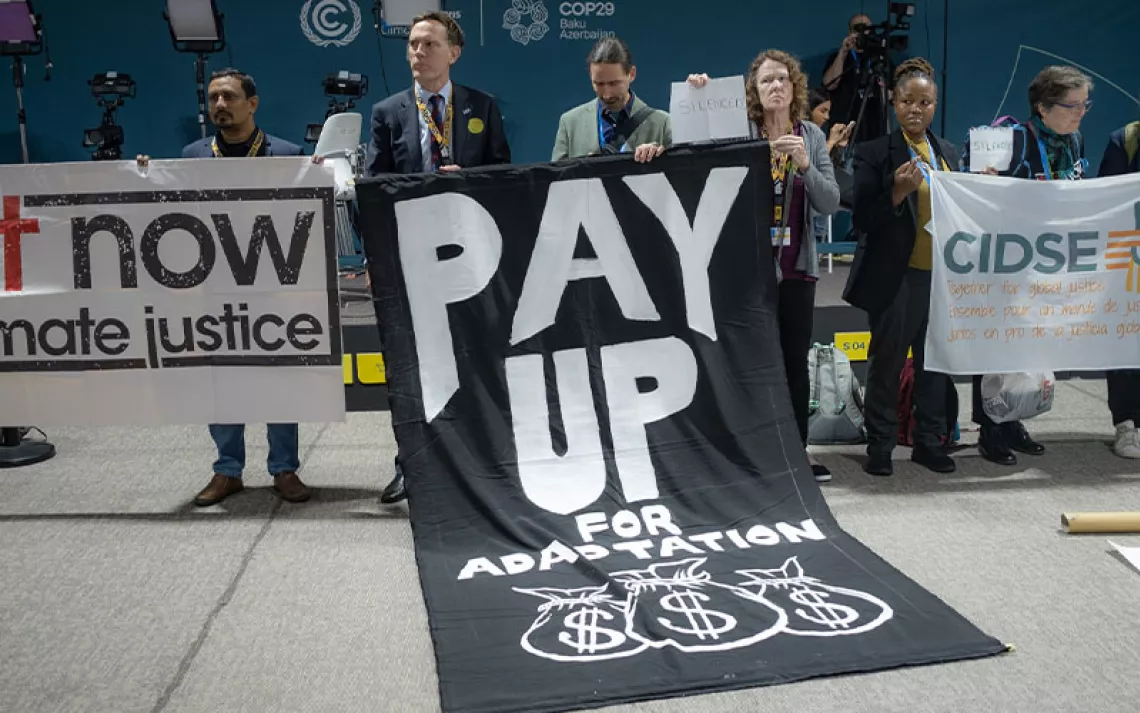California’s Fossil Fuel Lawsuit Could Mark a Turning Point in the Effort for Climate Change Accountability
The oil companies lied about climate change, and it’s time for them to pay, lawsuit charges

Illustration by Khanchit Khirisutchalual/iStock
Gavin Newsom was on fire.
In a speech last month to the United Nations General Assembly, the California governor dispensed with the usual bromides about how addressing the climate crisis will require action from governments, corporations, and citizens alike, and instead pointed a finger directly at those most responsible for the unfolding disaster: the fossil fuel companies.
“For decades and decades, the oil industry has been playing each and every one of us in this room for fools,” Governor Newsom told the gathering of world leaders and diplomats. “They’ve been buying off politicians. They’ve been denying and delaying science and fundamental information that they were privy to that they didn’t share or they manipulated. Their deceit and denial, going back decades, has created the conditions that persist here today.”
Days earlier, California had become the latest US jurisdiction to file a lawsuit against the major oil and gas producers, claiming that their well-documented history of spreading climate change disinformation has left the Golden State with billions of dollars in climate-change-related damages from fires, floods, and drought. Since 2017, more than two dozen cities, counties, and states in the US have filed similar lawsuits. Never before, however, has a state’s chief executive taken such a prominent and impassioned role in making the case that addressing the climate crisis is impossible without also holding the perpetrators accountable. “The climate crisis is a fossil fuel crisis—period, full stop,” Newsom told The New York Times’ David Gelles during one of his many appearances at the UN Climate Week. “The scale and scope of what California can do, we think it can move the needle. It can sure as hell can do this: It can illuminate their deceit.”
Bashing oil companies is, of course, a politically safe move for the leader of environmentally progressive California, where a majority of voters are supportive of climate action. But Newsom’s obvious presidential ambitions and his well-tested political savvy suggest that his fiery rhetoric may also resonate nationally. Lawyers involved with some of the cases against the oil giants, independent legal scholars, and fossil fuel watchdogs agree that the California governor’s barnstorming on behalf of the state’s lawsuit marks a turning point in a years-long effort to hold the carbon barons legally accountable for climate chaos. The constellation of lawsuits targeting the fossil fuel industry are closer than they’ve ever been to repeating the success of the 1990s litigation against Big Tobacco: making major corporations pay for lying to the public about the impacts of their products.
“It’s significant that [Newsom] has been out in front. I think what that tells you is that the governor has made a calculation that this is not just the right thing to do for the people of California—it’s the right thing to do politically,” said Marco Simons, general counsel at EarthRights International, which is representing three Colorado jurisdictions in a lawsuit against ExxonMobil and the Canadian oil producer Suncor Energy. “He wouldn’t be out there doing this, he wouldn’t be vocally out there, if he didn’t think a lot of people would be supportive.”
Richard Wiles, president of the advocacy group Center for Climate Integrity, agrees and said that focus groups and polling done by his organization have shown voters—across party lines—believe that companies should pay for damages linked to deception. “It’s the lying, and the notion of polluter pays, that motivates people like nothing else,” Wiles said. “It’s the tobacco logic. It’s the opioid logic. People get it. Nobody is taking the side of the opioid manufacturers anymore. These [legal] cases have the ability to erode the social license of the fossil fuel companies. And they are afraid of that more than anything else. Because they know they are guilty.”
California’s lawsuit against oil and gas producers including ExxonMobil, Chevron, and BP, along with the American Petroleum Institute, comes at a pivotal time for the climate-change accountability effort. In the six years since the first local lawsuits were filed against the fossil fuel corporations, Big Oil has sought to short-circuit the suits by moving them from the state courts where they’ve been filed to federal courts, which are considered a more sympathetic venue for the oil companies’ arguments. Every federal appeals court that has heard the oil companies’ pleas to change venue have dismissed their arguments, and in April the US Supreme Court refused to consider the issue.
Now, the oil company defendants have pivoted to a new strategy: trying to have the cases dismissed outright. But the cases are starting to inch forward anyway. The Hawai’i Supreme Court in August heard the Big Oil challenges to the City of Honolulu’s climate accountability case, and a Delaware court has considered arguments in the oil company defendants’ efforts to dismiss the State of Delaware’s case against them. In Massachusetts, ExxonMobil has exhausted all of its appeals in a case alleging the company violated the commonwealth’s consumer protection act, and the case is likely to go to trial in 2024.
The Supreme Court's decision not to intervene in the cases, the steady (if slow) progress of the lawsuits, and, now, California’s entry into the legal arena will very likely spur other cities and states to join the effort. “Some states might’ve been wondering, ‘Wait a minute, why hasn’t California done this yet?” said David Bookbinder, a veteran climate litigator who is involved in the Colorado cases. “Now that the state has jumped in, it could easily lead other states to say, ‘California is in? OK—we’re jumping in as well.”
Simons agrees. “California has the most resources behind it from a litigation-muscle standpoint,” he said. “It sends a strong signal that other states, cities, and counties should file their own cases. This is far from a fringe legal strategy at this point.”
While lawyers and advocates agree that the local government cases will almost certainly snowball, they are uncertain about one wild card: if and when plaintiff attorneys might file private lawsuits against the oil companies. The litigation against Big Tobacco was sparked by cases from private individuals, lifelong smokers who argued that the cigarette companies had deceived them about the risk of their products. After a few of those cases ended with jury awards, state attorneys general launched their own legal efforts for accountability—which were eventually joined by all 50 states. The climate litigation has followed an opposite pattern, with governments taking the lead. So far, there’s only one non-governmental lawsuit against the fossil fuel giants—a case brought by the Pacific Coast Federation of Fishermen’s Association versus Chevron.
At some point, plaintiff attorneys may begin to view the oil companies as a ripe target for litigation, an unpopular defendant not unlike asbestos companies and lead paint manufacturers. “I don’t mind saying that’s something we are looking into right now, working on behalf of non-governmental plaintiffs,” Simon said. “I wouldn’t be surprised if you started seeing more suits arising from particular disasters or other kinds of long-term trends.” He continued, “You are likely to see more cases that are filed, and frankly I hope that we do, because it’s not just governments that are suffering.”
In response to the burgeoning number of lawsuits filed against them, the fossil fuel corporations and their trade association continue to argue that the courts are a poor venue for dealing with an issue as large as global warming, which they maintain should be addressed by lawmakers.
"This ongoing, coordinated campaign to wage meritless, politicized lawsuits against a foundational American industry and its workers is nothing more than a distraction from important national conversations and an enormous waste of California taxpayer resources," the general counsel of the American Petroleum Institute, Ryan Meyers, told NPR. Climate policy should be set by Congress, “not the court system.”
Lawyers involved in the climate change accountability cases say they’re not asking the courts to make policy—only to decide whether to award damages to governments that have already had to pay for the consequences of burning fossil fuels. “If I had to sum it up,” Bookbinder said, “the argument is that they produced, refined, and marketed these products, knowing full well what impact those products would have—and at best they said nothing and at worst affirmatively misled people about those impacts.”
Korey Silverman-Roati, a senior fellow at the Sabin Center for Climate Change Law at Columbia Law school who is not involved with any of the litigation, describes the new California lawsuit as a “magnum opus” that “seems to combine” the strongest arguments of the state and local climate tort lawsuits filed to date. “What crystallizes in people’s minds is the facts of the complaint,” he said. “They [the oil companies] marketed their products as safe, but simultaneously went to state and national legislatures and lobbied against meaningful climate action. There’s an allegation that they undermined the legitimate political process.”
The California lawsuit is, in fact, striking for the way in which it connects the dots between Big Oil’s history of lying and today’s pattern of destruction. “This lawsuit seeks to hold those companies accountable for the lies they have told and the damages they have caused,” the complaint reads.
In a way, the most important part of the 135-page complaint comes on its final page. It’s a scant one sentence of litigation boilerplate, a pro-forma request in which the state asks that “all the issues presented … be tried by a jury.” And that, of course, is what the oil companies fear most—that someday their actions will be judged by a panel of ordinary citizens.
 The Magazine of The Sierra Club
The Magazine of The Sierra Club



